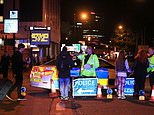Manchester Arena bombing failings could be repeated in another terror attack, public inquiry hears
Boss of firefighters’ union warns failings in emergency response to Manchester Arena bombing could be repeated in another terror attack, public inquiry hears
- Fire crews waited two hours to be told to go to scene of Manchester Arena attack
- Greater Manchester Police failed to inform local firefighters about the bombing
- The Fire Brigades Union said lives were saved ‘despite the failings of others’
- FBU said it ‘would be surprised’ if failings were not repeated at a similar attack
A senior figure from the firefighters’ union has warned failings in the emergency response to the Manchester Arena bombing could be repeated in another terror attack.
A public inquiry into the bombing that killed 22 innocent people in May 2017 has heard confusion early-on meant Greater Manchester Police did not properly update firefighters and paramedics about the attack.
Despite some firefighters being close enough to hear the bomb go off, crews did not attend until their bosses eventually gave the green light to go in two hours later.
Today Andy Dark, assistant general secretary of the Fire Brigades Union, stood by comments he made in January that pointed out the failings.
He said earlier this year: ‘That there were not more fatalities on the night was the consequence of the dedication and commitment of the frontline staff in all of the emergency services. They did this despite the failings of those others.
‘The failings of those others came as no surprise to the FBU.
‘If a similar incident was to occur in the UK, the FBU would be surprised if those failings were not to be replicated.


Greater Manchester Police failed to tell firefighters or the ambulance service that it had launched Operation Plato in response to the Manchester Arena bombings in May 2017. An inquiry has heard there was just one paramedic on the scene for 40 minutes, while it took two hours for firefighters to arrive
‘In fact we will be surprised if the FRS (fire and rescue service) performance in any such future incident were not to be worse.’
Suicide bomber Salman Abedi detonated his device in the City Room or foyer of the arena, killing 22 people and injuring hundreds more at 10.31pm on May 22 2017.
The inquiry has heard Greater Manchester Fire and Rescue Service had firefighters and specialist teams ready to go in that were trained in operating in terror incidents and treating bomb blast and gunshot casualties which could have saved lives.
Greater Manchester Police (GMP) had declared Operation Plato, a pre-planned response to what they believed was a marauding terrorist firearms attack, as erroneous reports of gunfire had come in.


Andy Dark from the Fire Brigades Union said emergency workers managed to save lives at the bombing ‘despite the failings of others’. Mr Dark said the union would not be surprised if the same mistakes were made at another terror attack


Salman Abedi killed 22 men, women and children in the blast in May 2017. The inquiry is looking at events before, during and after the suicide bombing
But they failed to inform the fire and ambulance services and communications between the 999 services broke down, with GMP’s duty officer in the HQ swamped with calls and the fire service unable to contact him.
It meant fire crews were kept away from the scene amid fears an active gunman was on the loose, even though it soon became clear the bombing was not the prelude to further attacks and GMP, British Transport Police and the ambulance service were all at the scene.
GMP declared the operation 16 minutes after Salman Abedi detonated a backpack bomb, amid reports that gunfire had been heard.
The inquiry has heard that only one paramedic was at the scene of the bombing for the first 40 minutes after the explosion on May 22, 2017 and that the first fire engine arrived more than two hours after the blast.


Mr Dark confirmed to inquiry chairman Sir John Saunders that ‘without any sense of satisfaction’, he stands by his January statement.
He said he is not saying none of the lessons from the arena bombing have been learned and taken on board, but they have no way of telling how well or wide they can be applied across the variety of fire and rescue services with differing capabilities.
The inquiry is looking at events before, during and after the suicide bombing by 22-year-old Abedi at the end of an Ariana Grande concert.
![]()


